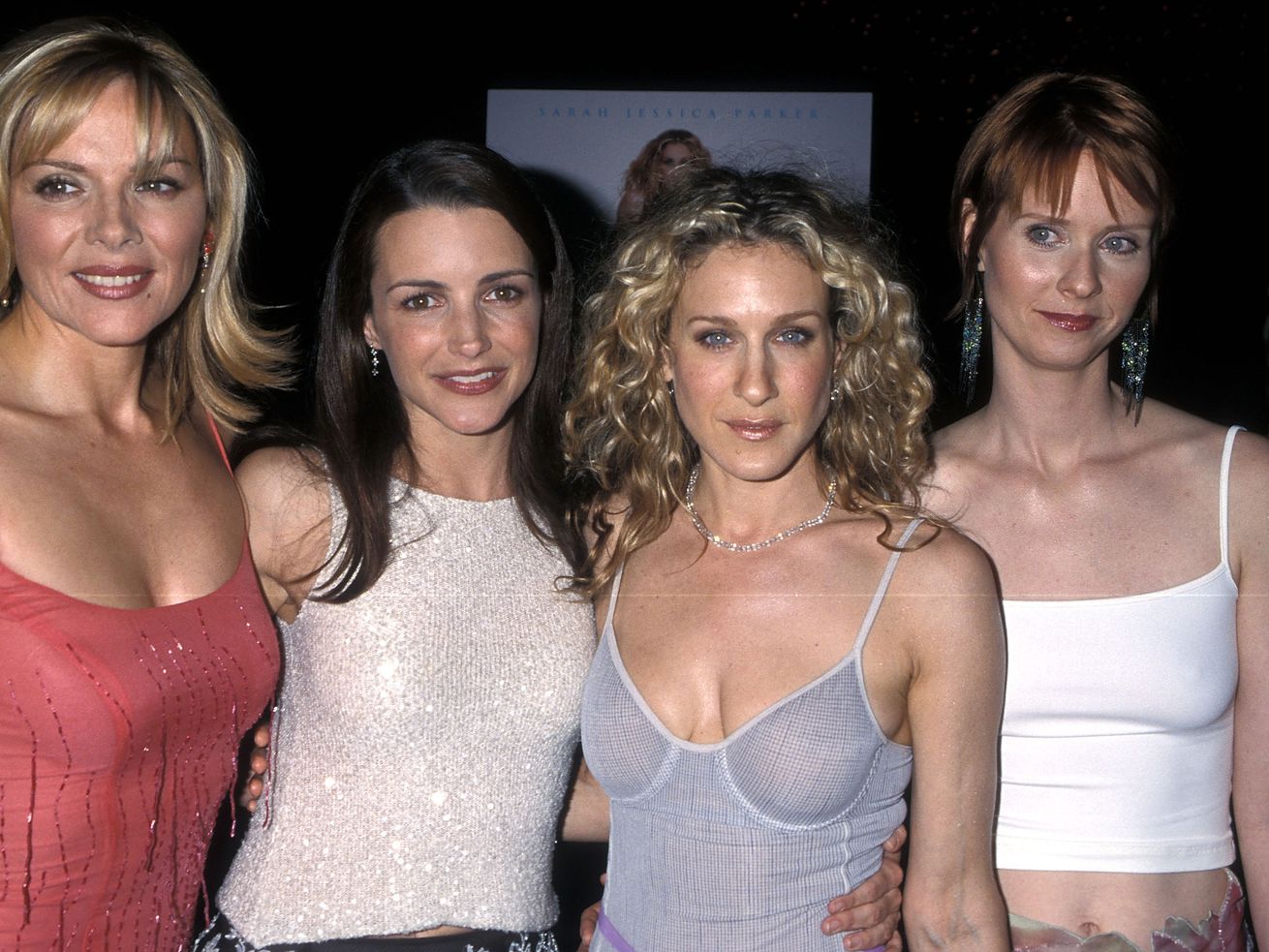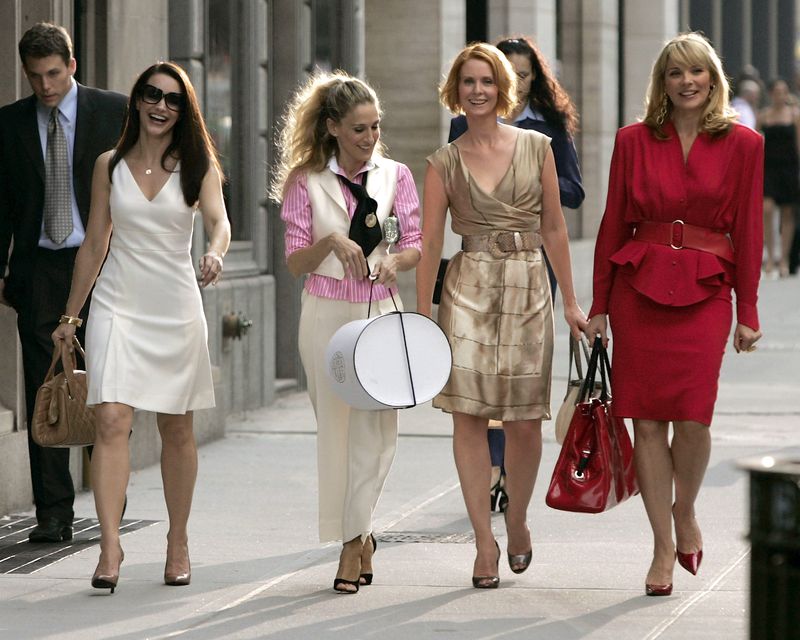April 9, 2024:

Carrie Bradshaw is a menace. That’s the point.
In another major licensing grab for Netflix, HBO’s juggernaut Sex and the City officially landed on the platform this week. Older fans of the show are already anticipating the possibility of Gen-Z’s horrified reaction to the raunchy and, in some ways, culturally outdated show. Can today’s youth stomach Carrie’s confusion over bisexuality or the women’s obsession with thinness? Will “puriteens” be scandalized watching Samantha Jones hook up with a random delivery guy?
Lest we forget, Sex and the City has been available to stream for years. So the idea that teenagers and early 20-somethings have never engaged with the series before is a little presumptuous. (They’ve surely encountered some fashion inspo TikToks.) Rather, it seems like this move to Netflix has given everyone a chance to reignite the now-decades-long discourse about the show’s storylines and characters.
It’s only natural then that social media users are already firing off takes about Carrie Bradshaw. To be fair, fans are never not discussing the show’s polarizing protagonist. In the years during and after the show aired in 1998, Carrie was largely celebrated as a feminist triumph — the rare single, childless (and messy) woman in her 30s portrayed in a (somewhat) aspirational light.
“We had never seen female characters date this way or talk this way before on television,” says Jennifer Keishin Armstrong, author of Sex and the City and Us: How Four Single Women Changed the Way We Think, Live, and Love. “Carrie was at its center, which is a position often reserved for the sane, grounded, most relatable one.”
However, the 2010s saw a wave of essays and criticism reevaluating her character — mostly by emphasizing her more annoying qualities — which the show occasionally downplayed. Was Carrie ever the ideal image of female independence, or just a self-absorbed, self-destructive nightmare?
In 2024, the latter opinion has become more of a default perspective, and the primary lens through which many fans seem to enjoy the show. How did this anti-Carrie sentiment come to consume so much of the discourse surrounding SATC — a lighthearted but textually rich show with an abundance of interesting talking points, a slew of actual villains, and three other complex main characters?
On one hand, the nonstop Carrie criticisms feel a bit reflexive, more like a meme than an actual analysis of merit. On the other hand, she’s given audiences a lot to be frustrated with over six seasons, from her surprising prudishness to her pathetic longing for her main love interest, Mr. Big.
Critics tend to highlight her self-centered tendencies, including cheating on her boyfriend Aidan and having an affair with Big while he was engaged to another woman. Vox’s Alex Abad-Santos writes that Carrie’s essentially the blueprint for what the internet has labeled “main character syndrome,” citing a season four episode — one I consider useless plot filler — where she expected her friend Charlotte to sell her engagement ring to loan her thousands of dollars.
More recent TikToks and tweets have used Carrie as an informal case study in insufferable and even “toxic” behavior. In one TikTok, songwriter and content creator Kady Brown (@KadyzRoxz), who makes videos about relationships and mental health, argues that Carrie surpasses the threshold of a “complicated character.” Rather, she considers her a “master manipulator” and “narcissist.”
@kadyroxz What if I told you Carrie & Big were equally yoked? #satc #carriebradshaw #femalefriendship #narcissisticabuse
♬ original sound – KadyRoxz
Brown, 30, tells Vox that she first watched SATC when she was 22. However, in revisiting the show in her late 20s with a “fully developed frontal lobe,” she was met with “an undeniable ick of Carrie.”
“I love the series,” she says. “I love most of the women. But, as a proper adult who believes she’s done her healing work, nothing could divorce me from the idea that Carrie has to be stopped!”
Brown says, in her rewatch, she was mainly struck by the way Carrie argues with her friends, and she sees the character as an “externalizer.”
“Carrie’s weaponized Miranda’s trust issues to avoid accountability in conversations about Big,” she said, referencing a season three episode. “And when Charlotte told Carrie it was a mistake to have dinner with her ex-boyfriend while married to Big, Carrie brought up Charlotte’s fear of being cheated on.”
Other fans, like 30-year-old Katherine D. Morgan, an author and SATC watcher since her teens, argue that Carrie’s bad qualities are overstated within the fandom, especially compared to other faulty characters like Charlotte and Samantha — the latter of whom she says is also an “asshole.” Additionally, she says the term “narcissist” is “thrown around way too freely.”
“Carrie’s the main character, so, of course, she talks about herself a lot,” Morgan says.
“She’s a flawed human being,” she says. “Some people are bad at handling money. Some people date people who aren’t the best for them. Sometimes, those people are your best friends. So if you’re saying this person is terrible, you could also say the people you associate with are terrible.”

The harsh reactions to Carrie’s antics are particularly interesting to see today. In 2024, the “unlikable” protagonist whose life is in shambles is a common leading archetype in many female-driven television comedies, like Sam in the Bridget Everett vehicle Somebody Somewhere or Brooke Dubek in the recently concluded The Other Two. In 2022, the New York Times noticed an increasing appetite for female protagonists “who undermine their own growth” and are “more likely to be mired in failure than striving toward wedding rings and corner offices” — much like Carrie throughout SATC. Love her or hate her, it’s Carrie Bradshaw and her no-good decisions who is responsible for some of our favorite irresponsible women on TV.
Subsequent HBO shows like 2013’s Girls and 2016’s Insecure — as well the Emmy-winning Prime Video show Fleabag, which also premiered in 2016 — relied on this archetype and gained popularity for their honest, sometimes brutal depictions of youngish womanhood. This expectation has taken over reality TV, too. People tune into Bravo’s Real Housewives franchise primarily to watch women make bad decisions and behave in transgressive ways.
Morgan notes that the way viewers are trained to watch SATC, compared to other shows, could also have to do with this strong repulsion toward Carrie. The famous question of “Are you a Carrie, Samantha, Miranda, or Charlotte?” can make consuming the show a more self-reflective experience, like filling out a personality questionnaire.
“People think that if they can identify with Carrie that suddenly means they’re a godawful person,” Morgan says.
Viewers who initially approach the show this way may misunderstand Carrie — and the rest of the women — as characters who are solely meant to be aspirational, relatable avatars as opposed to categorical “antiheroines.” The “antihero” title is often more readily thrown at male protagonists who are violent and/or less morally ambiguous, such as Tony Soprano, Walter White, Dexter Morgan, and Don Draper — even though Carrie, as Keishin Armstrong says, came before all of them.
“She was one of TV’s first, if not the first, true TV antiheroine,” Keishin Armstrong says. “She smoked. She drank. She was absolutely excruciating to watch as she chased after Big.”
“I was longing for more flawed female characters at the time, which was still very much the era of sunny chick lit and rom-com heroines,” she says. “Their worst flaws were that they were clumsy or shopped too much.” (In Carrie’s case, being an occasional klutz and a shopping addict were the least of her problems.)
That said, it’s hard not to attribute at least some of the compulsive nitpicking of Carrie to sexist attitudes. Compared to the male mobsters on The Sopranos or Don Draper — who are babygirlified online and met with lighthearted takes about their sex appeal — there seems to be an expectation that Carrie should have a strong moral character. (When weighed against murderers and serial misogynists, she does.) She even somehow gets a worse rap than the terrible men on SATC, like Big, a middle-aged fuckboy, or Aidan, who took her back after she cheated on him just to emotionally torment her.
Overall, these repeated declarations of Carrie’s “awfulness” seem to misunderstand her flaws as a bug and not a feature of a show about a group of rich, solipsistic white women. There’s a valid argument that it’s pleasant to watch characters grow and reflect on their mistakes. For example, Carrie’s continually misguided antics in Sex and the City 2 and the Max reboot And Just Like That… feel like legitimate failures in the progression of her arc. However, watching the original series solely through anti-Carrie goggles is missing the point and half the humor of the partly surreal and ridiculous show.
Likewise, would a more refined, less “delulu” version of Carrie result in an equally compelling and outrageous series? Morgan argues no, claiming that “nothing would’ve happened” if it weren’t for Carrie acting out on her insecurities and constantly ignoring red flags. At the very least, Carrie gave viewers something to talk about and debate together.
There’s also a fine line between a character being unlikable and unwatchable. Based on the sheer amount of people who love and repeatedly watch SATC, Carrie seemingly doesn’t fit into the latter category. That also rings true for content creator Brown, who says that Carrie doesn’t entirely spoil the show for her. Maybe this is because Carrie’s less pleasant attributes largely result in self-sabotage — which she miraculously tends to bounce back from — rather than causing harm to her friends. While she’s occasionally gotten into tiffs with the other women, as they all have, she remains a well-qualified lead character in a love story about the ups and downs of female friendship.
Similarly, Morgan believes that Carrie is mostly a “good friend,” recalling how she supported Samantha during her breast cancer diagnosis and Charlotte after her miscarriage. “Everyone reaches out to her.”
On a more basic note, Keishin Armstrong says that Carrie just seems like an amusing person to have in your friend circle.
“I think of Carrie as that friend whose choices you always roll your eyes at, but you’re friends with anyway,” she says. “She gets you into good parties and clubs and always has some entertaining story about how much her life sucks, even if it’s probably her fault.”